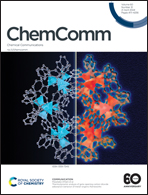Production of hydrogen from alcohols via homogeneous catalytic transformations mediated by molecular transition-metal complexes
Abstract
Hydrogen obtained from renewable sources such as water and alcohols is regarded as an efficient clean-burning alternative to non-renewable fuels. The use of the so-called bio-H2 regardless of its colour will be a significant step towards achieving global net-zero carbon goals. Challenges still persist however with conventional H2 storage, which include low-storage density and high cost of transportation apart from safety concerns. Global efforts have thus focussed on liquid organic hydrogen carriers (LOHCs), which have shown excellent potential for H2 storage while allowing safer large-scale transformation and easy on-site H2 generation. While water could be considered as the most convenient liquid inorganic hydrogen carrier (LIHC) on a long-term basis, the utilization of alcohols as LOHCs to generate on-demand H2 has tasted instant success. This has helped to draw a road-map of futuristic H2 storage and transportation. The current review brings to the fore the state-of-the-art developments in hydrogen generation from readily available, feed-agnostic bio-alcohols as LOHCs using molecular transition-metal catalysts.



 Please wait while we load your content...
Please wait while we load your content...